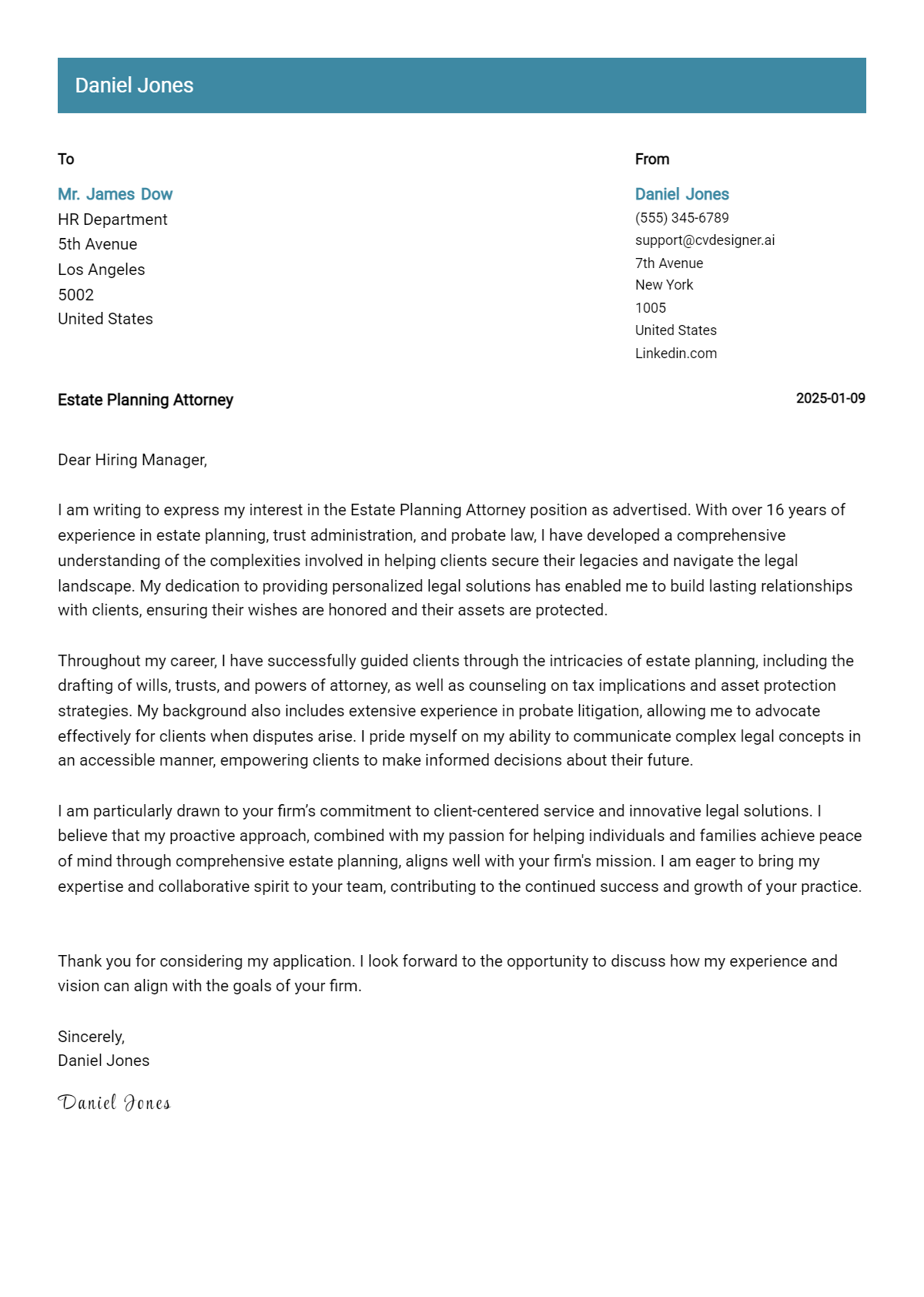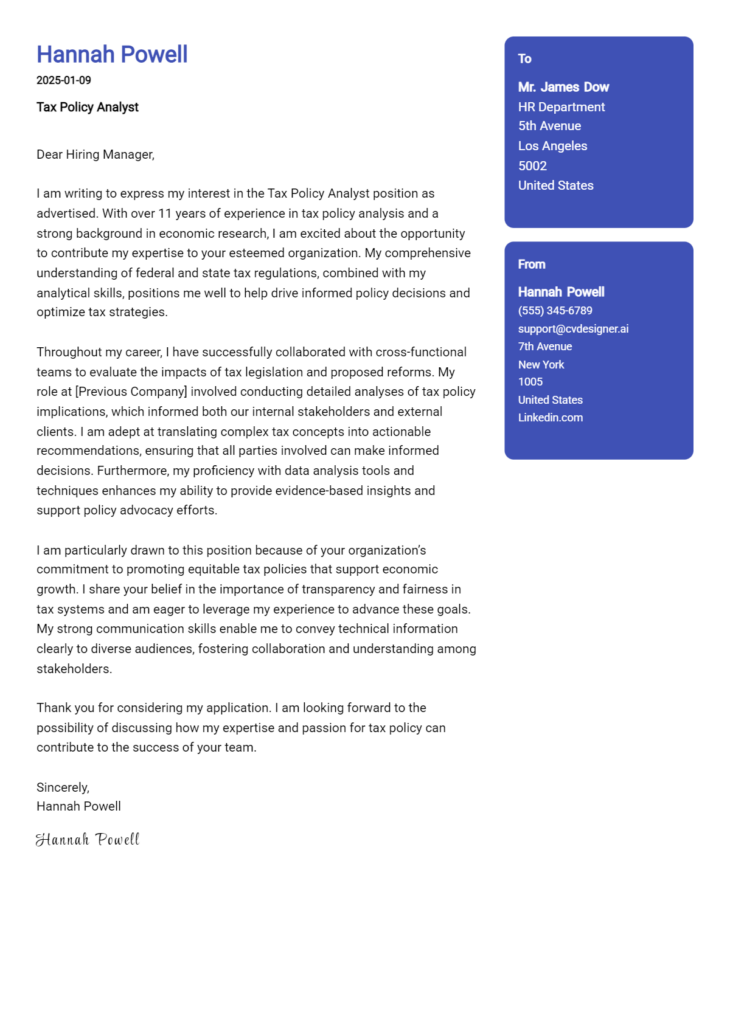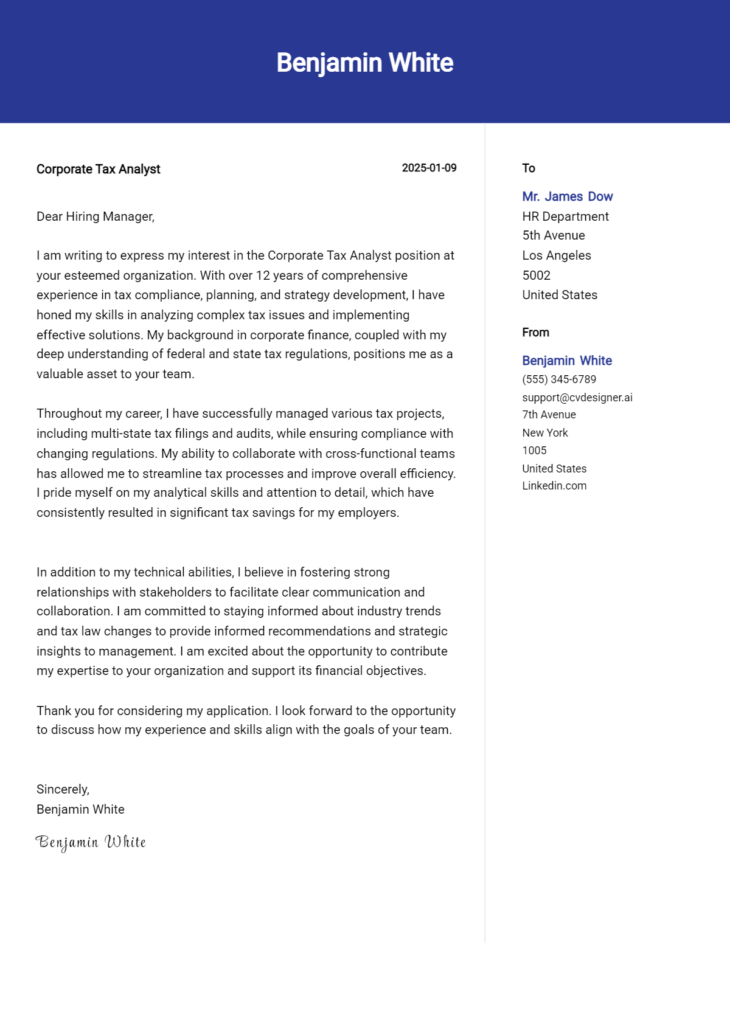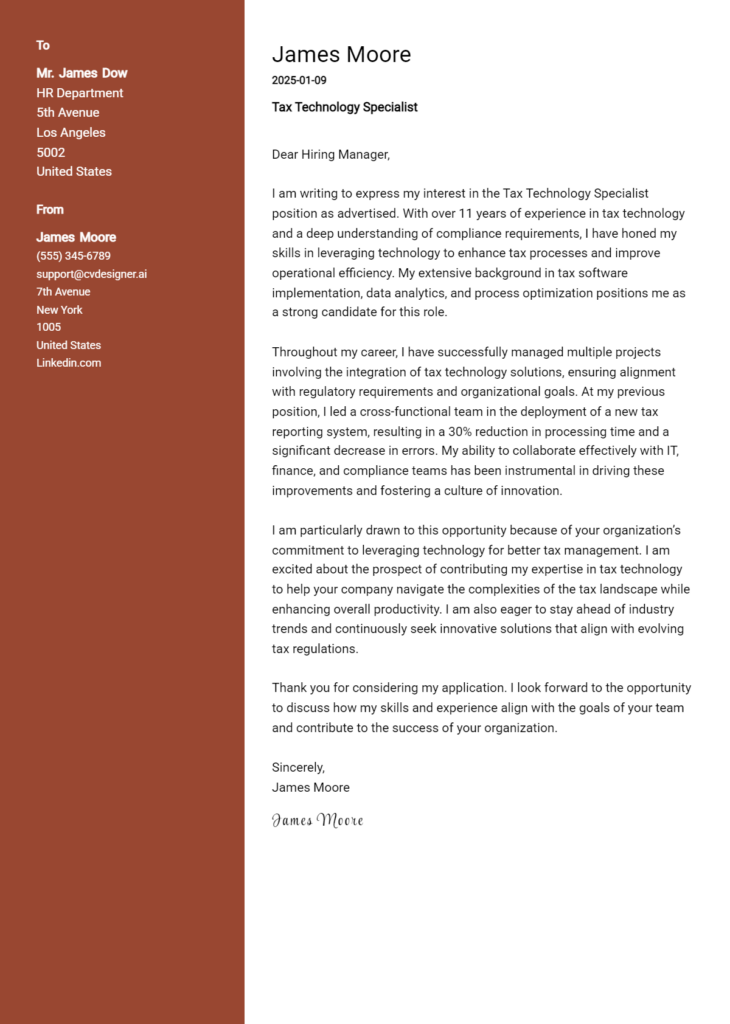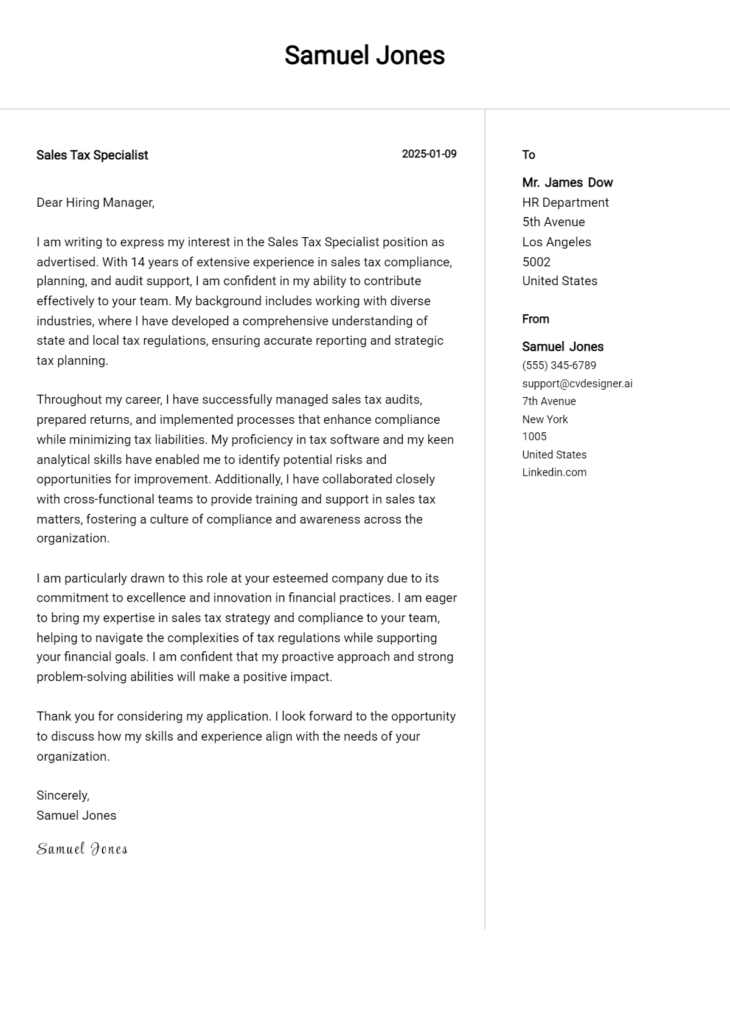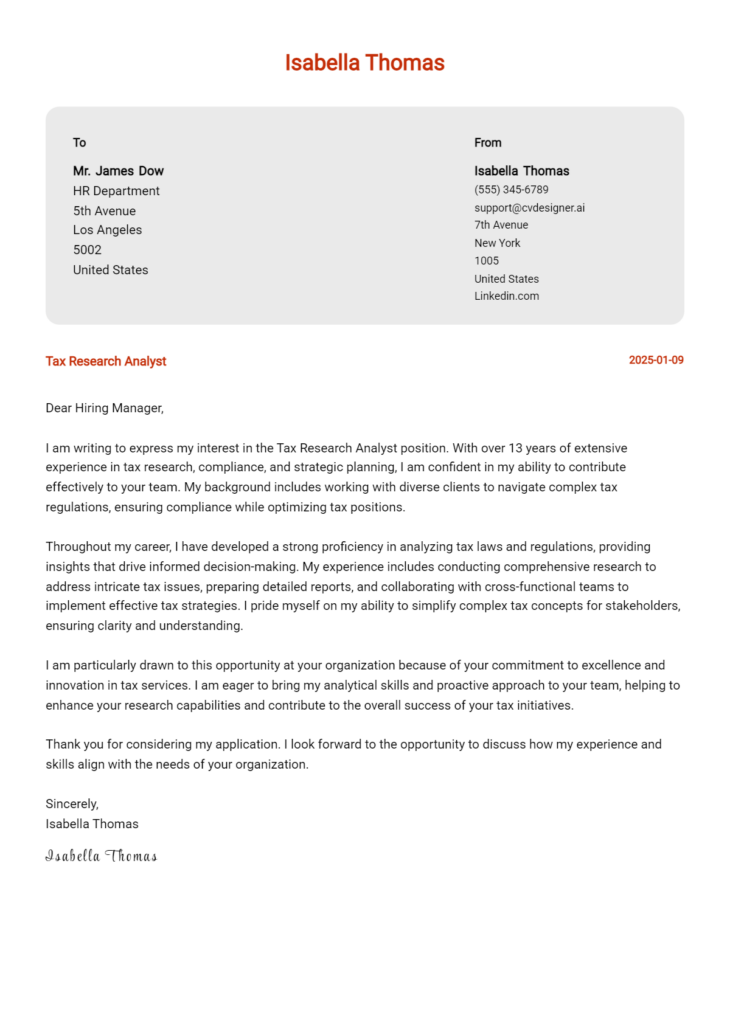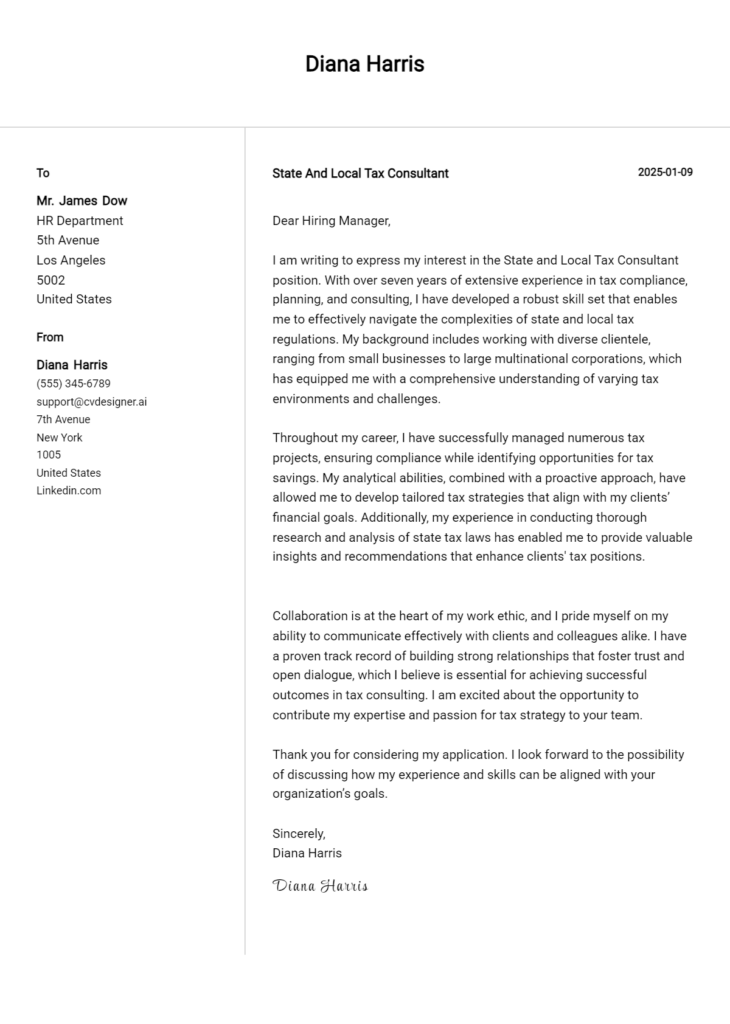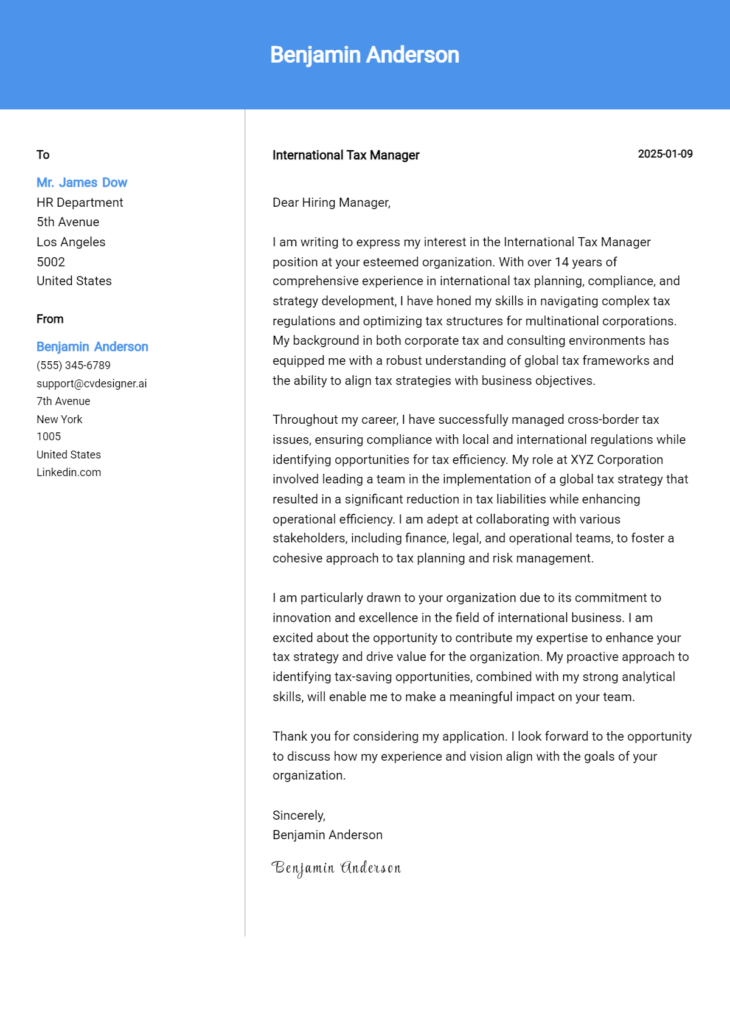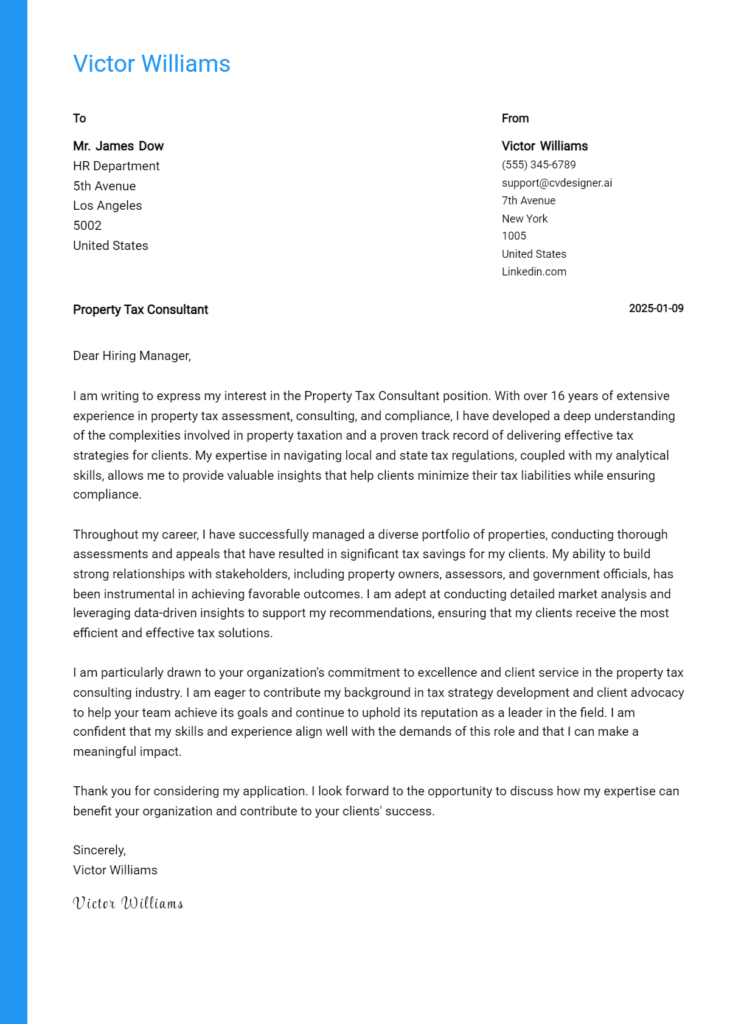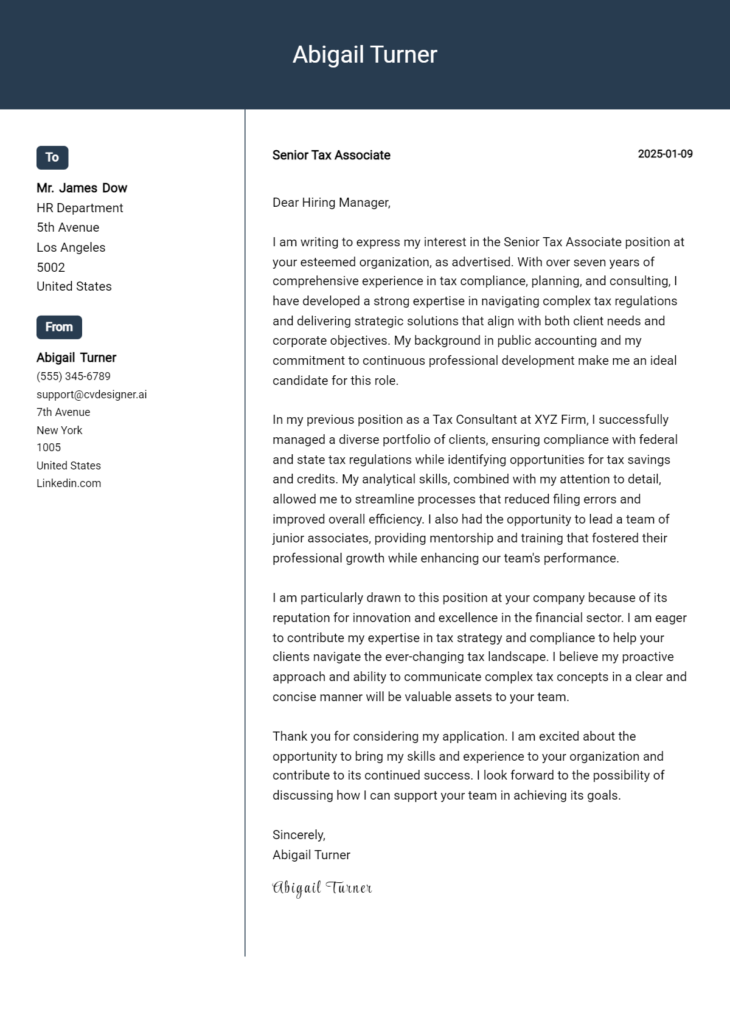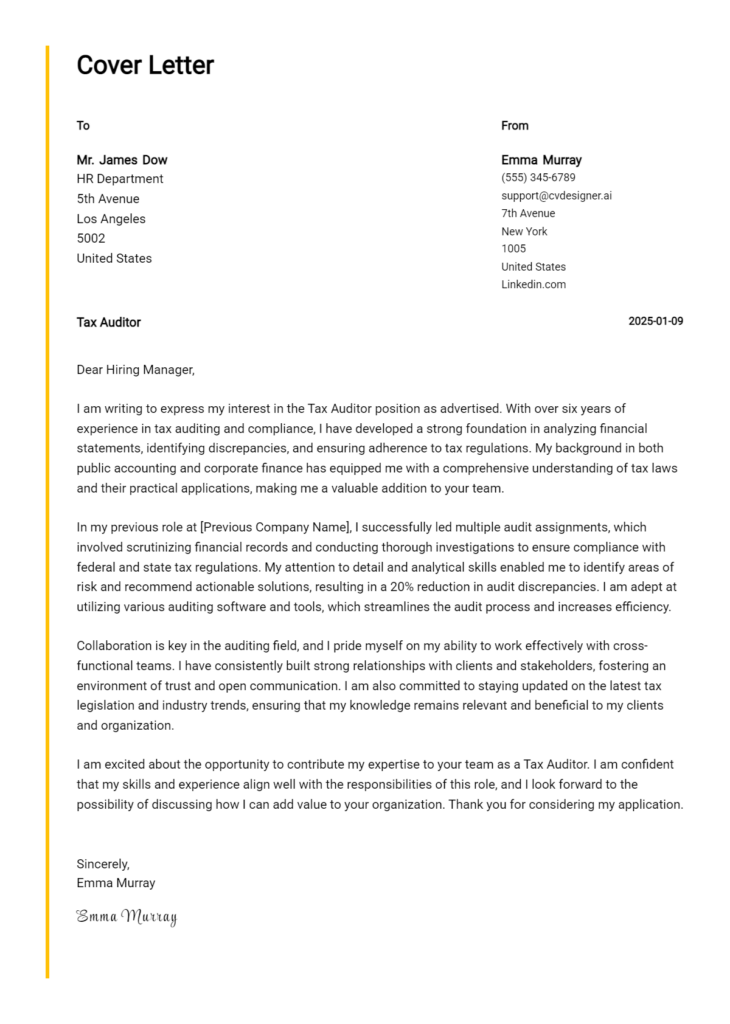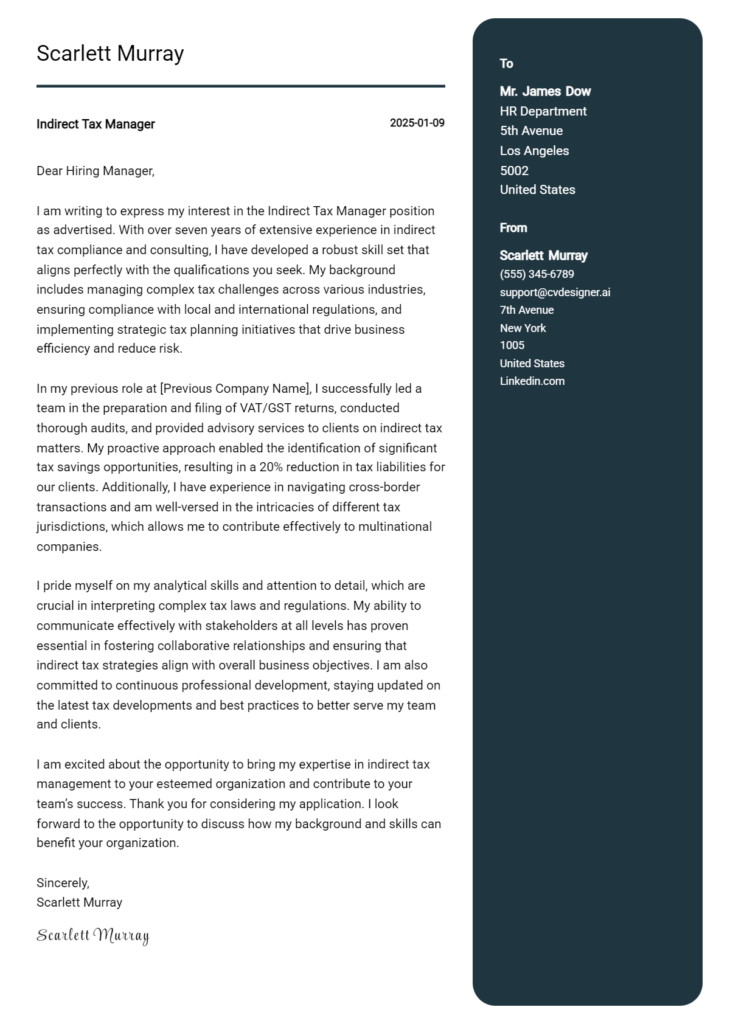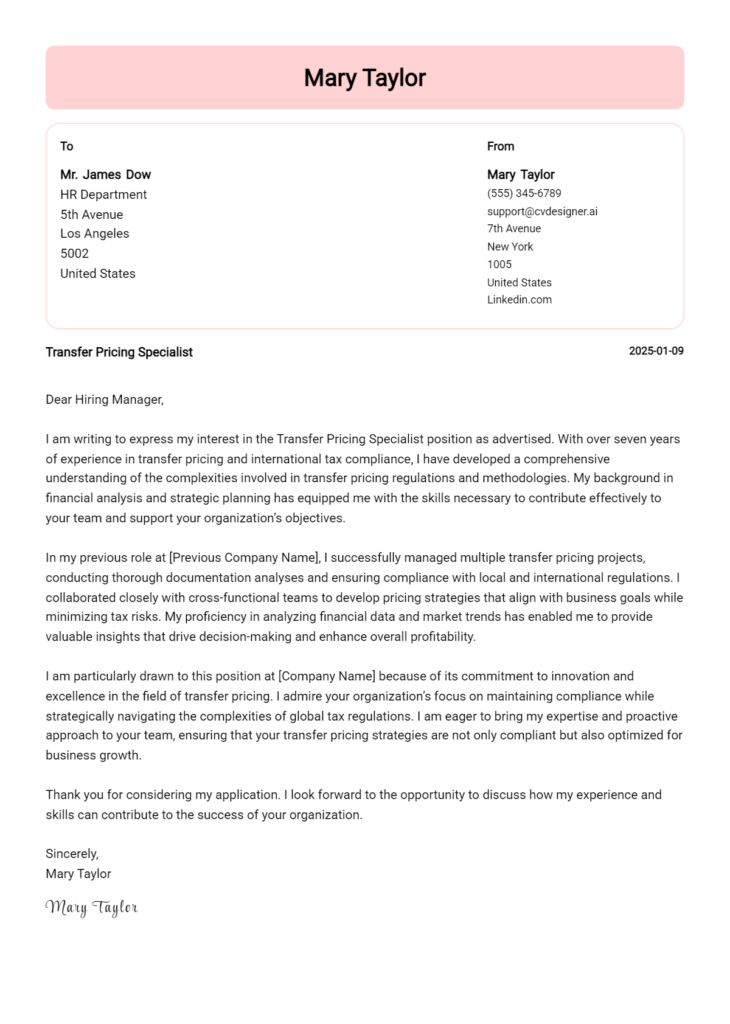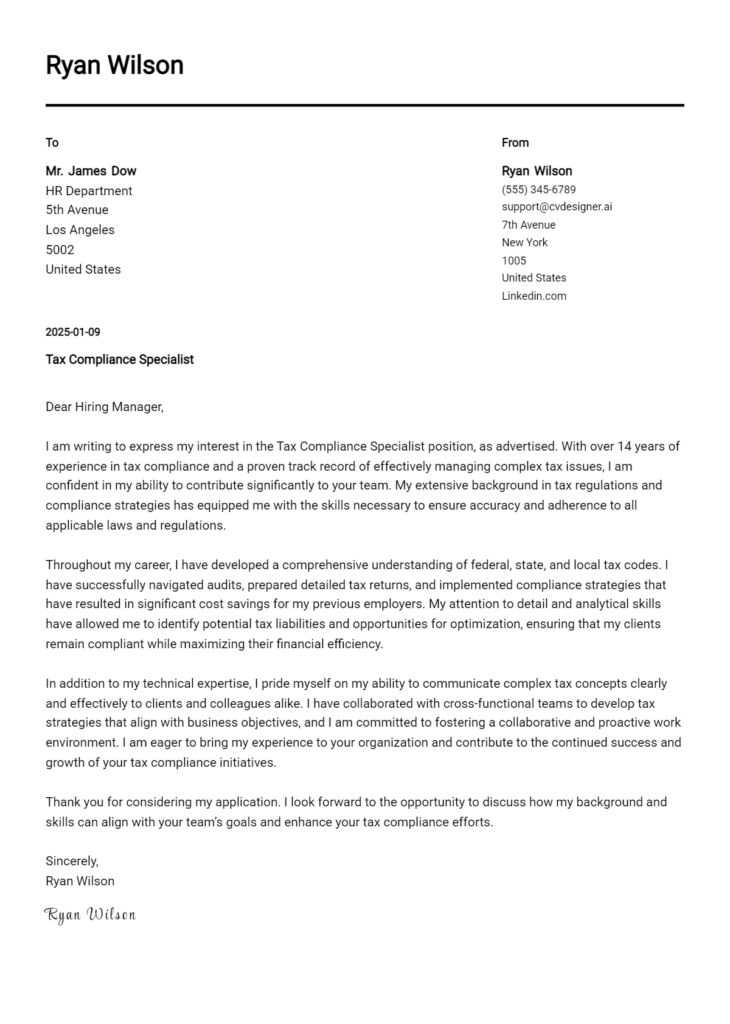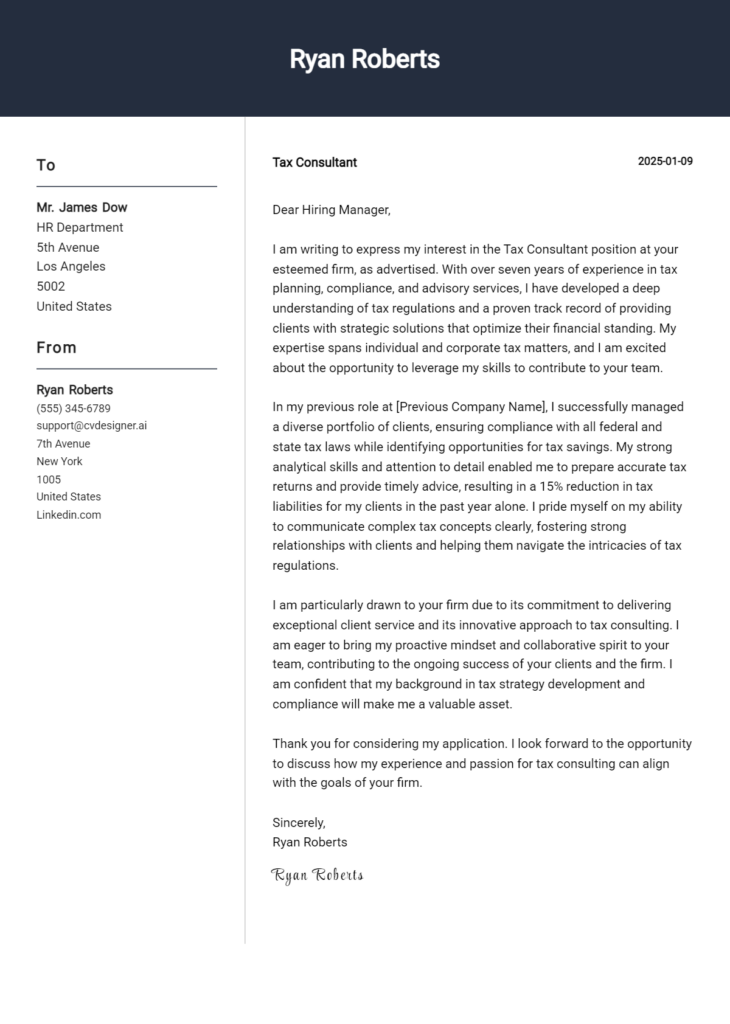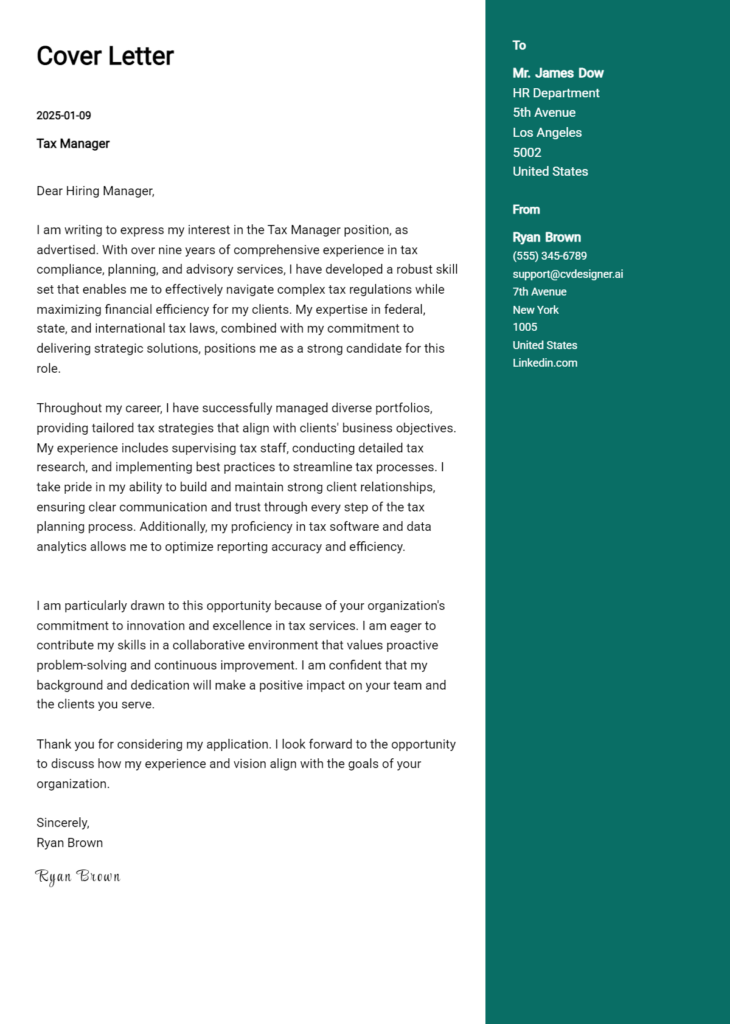Estate Planning Attorney Cover Letter Examples
Explore additional Estate Planning Attorney cover letter samples and guides and see what works for your level of experience or role.
How to Format an Estate Planning Attorney Cover Letter
Crafting an impactful cover letter is essential for an Estate Planning Attorney, as it not only showcases your legal expertise but also reflects your ability to communicate effectively with clients and colleagues. The way you format your cover letter can significantly influence a hiring manager's perception of your professionalism and attention to detail, which are critical in the legal field. A well-structured cover letter captures the reader's interest while demonstrating your commitment to providing comprehensive estate planning services.
In this guide, we will outline how to structure your cover letter, providing insights and examples tailored to the estate planning profession.
We will focus on the essential components of a professional cover letter, including:
- Cover Letter Header
- Cover Letter Greeting
- Cover Letter Introduction
- Cover Letter Body
- Cover Letter Closing
Each section is crucial in presenting your qualifications and professionalism effectively. Let’s delve into each part to help your estate planning attorney cover letter stand out.
The Importance of the Cover Letter Header for an Estate Planning Attorney
The cover letter header is a critical component of any job application, particularly for an Estate Planning Attorney, as it sets the tone for professionalism and clarity. A well-structured header not only provides essential contact information but also establishes a sense of organization and preparedness. It should include your name, address, phone number, email, the date, and the recipient's name and address. Ensuring that this information is clear and formatted correctly is vital, as it makes it easy for potential employers to reach out and demonstrates your attention to detail—a key trait in estate planning.
Strong Example:
John Doe 123 Main Street Cityville, ST 12345 (123) 456-7890 johndoe@email.com October 10, 2023 Ms. Jane Smith Hiring Manager ABC Law Firm 456 Elm Street Townsville, ST 67890
Weak Example:
johndoe@email.com 10/10/23 ABC Law Firm
The Importance of a Strong Cover Letter Greeting for an Estate Planning Attorney
The greeting in a cover letter plays a crucial role in setting the tone for the rest of the letter. It serves as the first point of contact and can create an immediate impression of professionalism and personalization. Addressing the hiring manager directly not only shows respect but also indicates that you have taken the time to research the firm and its team. Avoiding generic greetings, such as "To Whom It May Concern," helps to convey genuine interest in the position and the organization. If the recipient's name is not readily available, a quick search on the firm's website or LinkedIn can often yield the information needed to personalize your greeting.
When crafting your greeting, consider the following strong and weak examples to guide your approach.
Strong Greeting Example
Dear Ms. Johnson,
Weak Greeting Example
To Whom It May Concern,
Importance of a Well-Crafted Cover Letter Introduction for an Estate Planning Attorney
A compelling cover letter introduction is crucial for an Estate Planning Attorney, as it serves as the first impression to the hiring manager. This section should not only capture attention but also convey genuine interest in the position while showcasing relevant skills and achievements. A well-written introduction can set the tone for the rest of the letter, making it imperative to get it right. Below are examples of strong and weak cover letter introductions to illustrate the difference.
Strong Example
Dear [Hiring Manager's Name], As a dedicated Estate Planning Attorney with over five years of experience in crafting comprehensive estate plans, I am excited to apply for the position at [Company’s Name]. My proven track record in helping families secure their legacies, coupled with my expertise in navigating complex probate issues, aligns perfectly with your firm’s commitment to providing exceptional client service. I am eager to leverage my skills in estate law to contribute to your team and support your clients in achieving their estate planning goals.
Weak Example
To whom it may concern, I am interested in the Estate Planning Attorney position that was recently posted. I have some experience in law and think I could do the job. I’ve done a little work with estates but not much. I hope to hear back soon.
Purpose of the Cover Letter Body for an Estate Planning Attorney
The cover letter body for an Estate Planning Attorney serves as a critical component in demonstrating the candidate's qualifications and alignment with the prospective employer's needs. This section allows the applicant to articulate their relevant skills, experiences, and specific projects that showcase their expertise in estate planning. By detailing successful accomplishments, such as the establishment of comprehensive estate plans for high-net-worth clients or the resolution of complex probate issues, the candidate can effectively convey their value to the firm. A well-crafted cover letter body not only highlights the attorney’s legal knowledge but also emphasizes their ability to build client relationships and navigate sensitive family dynamics, which are essential in estate planning.
Strong Example
Dear [Hiring Manager's Name], I am excited to apply for the Estate Planning Attorney position at [Company Name]. With over five years of experience in estate planning, I successfully drafted over 200 estate plans for clients, ensuring their assets were protected and their wishes honored. One notable project involved working with a family to restructure their estate plan after a significant life change, resulting in a 30% reduction in their tax liabilities while preserving their legacy for future generations. My ability to navigate complex legal landscapes and foster trusting relationships with clients has enabled me to deliver tailored solutions that meet their unique needs. I am eager to bring my expertise to [Company Name] and contribute to your team’s mission of providing exceptional estate planning services. Sincerely, [Your Name]
Weak Example
Dear [Hiring Manager's Name], I want to apply for the Estate Planning Attorney position at [Company Name]. I have some experience with estate planning and have worked with a few clients. I think I can do well in this role because I know a bit about the law. I hope to help clients with their plans, and I believe I would fit in well with your team. Best, [Your Name]
Importance of the Cover Letter Closing for an Estate Planning Attorney
The closing paragraph of a cover letter is crucial for an Estate Planning Attorney as it serves to summarize qualifications, reiterate interest in the position, and encourage the employer to take the next steps, such as reviewing the resume or scheduling an interview. A strong closing paragraph can reinforce the candidate's suitability for the role and leave a lasting impression, while a weak closing may fail to convey enthusiasm or professionalism, ultimately diminishing the overall impact of the application.
Strong Example
Thank you for considering my application for the Estate Planning Attorney position at [Company Name]. With a solid background in estate law, extensive experience in drafting wills and trusts, and a deep commitment to helping clients secure their legacies, I am excited about the opportunity to contribute to your team. I look forward to discussing how my skills can meet the needs of your clients. Please feel free to contact me at your earliest convenience to schedule a conversation. Thank you once again for your time and consideration.
Weak Example
I hope you like my letter. I think I would be a good fit for the Estate Planning Attorney job. You can look at my resume if you want. Let me know if you want to talk, or something. Thanks for reading this.
These tips will help candidates craft an effective cover letter for an Estate Planning Attorney position, emphasizing the significance of showcasing technical skills, problem-solving abilities, knowledge of the estate planning process, teamwork, and a passion for continuous learning. A well-written cover letter can set you apart from other candidates, demonstrating not only your qualifications but also your commitment to providing exceptional legal services.
Tips for Writing a Cover Letter for an Estate Planning Attorney
Highlight Your Technical Skills
Clearly outline your expertise in estate planning, including knowledge of wills, trusts, and tax implications. Be specific about the software and tools you’ve used in the estate planning process. This detail can convey your readiness to handle complex cases and your familiarity with the latest legal technologies. Consider using cover letter templates to structure this section effectively.Showcase Problem-Solving Abilities
Estate planning often involves navigating intricate legal challenges. Use examples from your previous experiences to illustrate how you approached and resolved issues for clients. Emphasizing your analytical skills and ability to think critically will demonstrate your capacity to provide tailored solutions in estate planning.Demonstrate Knowledge of the Estate Planning Process
Convey your understanding of the entire estate planning lifecycle, from client consultation to execution and review of documents. Discuss any experience you have with estate litigation or probate matters, as this adds depth to your profile and shows your comprehensive grasp of the field.Emphasize Teamwork and Collaboration
Estate planning often requires collaboration with financial advisors, accountants, and other professionals. Highlight your ability to work in a team environment, showcasing instances where you successfully collaborated with others to achieve favorable outcomes for clients. This illustrates your interpersonal skills and adaptability.Express a Passion for Continuous Learning
The legal field is constantly evolving, and expressing a commitment to ongoing education can set you apart. Mention any relevant certifications, courses, or workshops you have taken to enhance your expertise in estate planning. This commitment not only showcases your dedication but also reassures potential employers of your ability to stay updated with legal trends and changes.
By incorporating these tips into your cover letter, you can effectively communicate your qualifications and passion for the role of an Estate Planning Attorney. If you need additional assistance, consider using a cover letter builder to create a polished and professional document.
Common Mistakes to Avoid in an Estate Planning Attorney Cover Letter
Crafting a compelling cover letter is essential for standing out in the competitive field of estate planning law. Avoiding common mistakes can significantly enhance your chances of making a positive impression. Here are some pitfalls to steer clear of when writing your cover letter:
Generic Salutation: Addressing your letter to "To Whom It May Concern" can signal a lack of effort. Always try to find the hiring manager's name for a personalized touch.
Repetition of Your Resume: Your cover letter should complement your resume, not repeat it. Use this opportunity to highlight relevant experiences and explain how they relate to the specific role.
Lack of Specificity: Avoid vague statements. Provide concrete examples of your achievements, particularly those related to estate planning, to showcase your qualifications effectively.
Ignoring the Job Description: Tailoring your cover letter to the job description is crucial. Address the specific requirements and desired skills mentioned in the posting to demonstrate your fit for the position.
Overly Formal Language: While professionalism is key, overly formal language can come off as stiff. Aim for a conversational tone that reflects your personality while maintaining professionalism.
Neglecting Proofreading: Spelling and grammatical errors can undermine your credibility. Always proofread your cover letter multiple times and consider asking a colleague to review it as well.
Failing to Include a Call to Action: Ending your letter without a call to action may leave the hiring manager unsure of your intentions. Express your desire for an interview or a follow-up discussion to show initiative.
For more guidance on creating a standout cover letter, check out cover letter examples and learn about the appropriate cover letter format to enhance your application.
Cover Letter FAQs for Estate Planning Attorney
What should I include in my cover letter as an Estate Planning Attorney?
In your cover letter, highlight your legal expertise in estate planning, including relevant experience in drafting wills, trusts, and handling probate cases. Mention specific skills such as knowledge of tax implications, asset protection strategies, and family dynamics that influence estate decisions. Personalize your letter to the firm by referencing any specific cases or values they uphold. Additionally, express your commitment to client satisfaction and ethical practice, which are crucial in this sensitive area of law. Don’t forget to include your educational background, relevant certifications, and any notable professional affiliations.
How can I demonstrate my expertise in estate planning in my cover letter?
To effectively demonstrate your expertise, use concrete examples from your past work experiences. Discuss particular cases where you successfully navigated complex estate planning challenges, such as high-net-worth individuals or blended family situations. Highlight any specialized training or certifications you have received, such as being a member of the American Academy of Estate Planning Attorneys. Including metrics, such as the number of successful estates you managed or the amount of assets you helped protect, can also add weight to your claims. This evidence of your capabilities will make your cover letter more persuasive.
How long should my cover letter be for an Estate Planning Attorney position?
Your cover letter should be concise, ideally one page in length, which translates to about three to four paragraphs. Focus on being clear and direct while ensuring you cover all essential points. Start with a strong introduction that captures the reader's attention and clearly states the position you are applying for. Use the middle paragraphs to elaborate on your qualifications, experiences, and why you are a good fit for the firm. Conclude with a strong closing statement reiterating your enthusiasm for the position and a call to action, such as expressing your desire for an interview.
Should I include a specific example of a successful case in my cover letter?
Yes, including a specific example of a successful case in your cover letter can be highly effective. It provides tangible evidence of your skills and experience in estate planning, making your application stand out. Choose a case that illustrates your problem-solving abilities, creativity, and understanding of complex legal issues or client needs. Ensure that you maintain client confidentiality by avoiding any identifying details. Instead, focus on the challenges you faced, how you approached the situation, and the positive outcomes achieved. This narrative helps potential employers see your practical experience and dedication to client success.
Build your Cover Letter in minutes
Use an AI-powered cover letter builder and have your letter done in 5 minutes. Just select your template and our software will guide you through the process.

